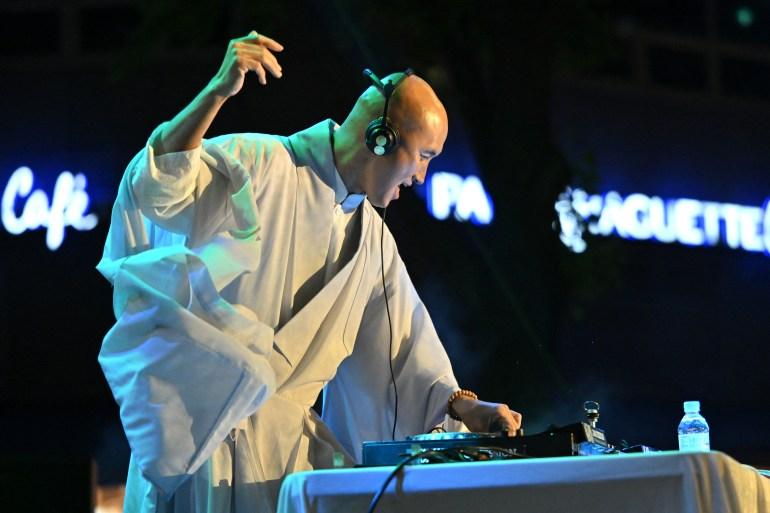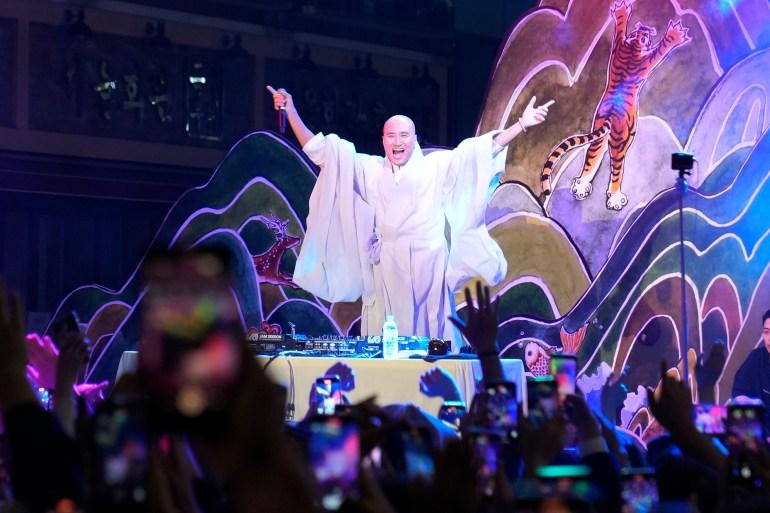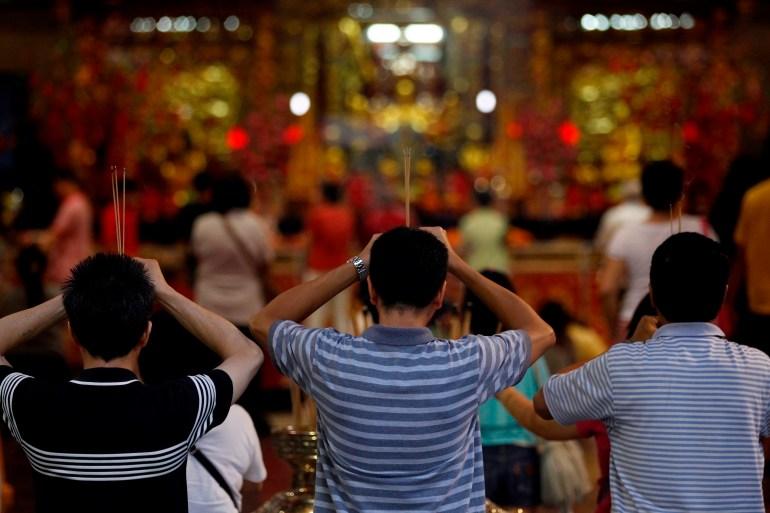Source: ALJAZEERA
ALJAZEERA MEDIA NETWORK

A South Korean DJ's performances in monk robes have stirred discontent among Buddhists in Singapore, leading to official complaints and government intervention.
Singapore – A renowned DJ from South Korea, known for wearing a monk's robe and merging electronic dance music with Buddhist chants, has provoked unrest among Buddhists in Singapore who argue he is disrespecting their faith.
On May 19, the Singapore Buddhist Federation urged the authorities to cancel NewJeansNim’s upcoming performances in June. In a Facebook post, they pointed out that despite not being an ordained monk, the DJ wears a monk's robe, which goes against the Vinaya, the code of conduct for Buddhist monks. The federation asked for his performance permits to be revoked to prevent embarrassment to Buddhists.
Singapore's Law and Home Affairs Minister K Shanmugam has since intervened, warning on Facebook that action would follow if NewJeansNim, whose real name is Youn Sung-ho, proceeds with his typical act. Supportive comments on the minister's post largely demanded the cancellation of the DJ’s performances altogether.
Following advice from the Singapore Police Force, Club Rich owner Jackie He informed Al Jazeera that the sold-out events would be non-religious. They will ensure NewJeansNim does not wear monk robes, use religious instruments, or play Buddhist chants. A club management member mentioned that Youn agreed to the stipulations, noting that Buddhist elements are just a part of his act. However, Youn has not officially commented on the issue.
Kelvin Siau, a dedicated Buddhist, expressed his desire for stricter measures, stating, “He should be barred from entering Singapore. This is to show that Singapore is stringent on religious matters,” describing NewJeansNim's act as “disrespectful” and “an insult to Buddhism and monks”.
Club Rich is located close to one of Singapore’s largest and most popular Buddhist temples. According to a 2020 census, over a third of Singapore's population adheres to Buddhism, making it the dominant religion in the city-state.
Leow Yuan Kai, 36, another lifelong Buddhist, had a more lenient view, stating, “My friends and I do not believe the performance warrants concern. It’s in a nightclub appealing to a specific audience demographic.”
 NewJeanNim performing in Seoul. He is wearing a robe and his arms are stretch out. The lighting around him is purple and the crowd are dancing.
NewJeanNim performing in Seoul. He is wearing a robe and his arms are stretch out. The lighting around him is purple and the crowd are dancing.
This is the second instance in recent weeks where Youn, a 47-year-old comedian-turned-musician, has upset Buddhists in Southeast Asia. Earlier in May, a Kuala Lumpur nightclub cancelled his second set following complaints from senior Buddhist clergy and politicians who called for a ban on his future events in Malaysia for the sake of social harmony.
Conversely, Youn, shaven-headed and delivering homilies, is gaining popularity in South Korea among Gen Z and Millennials. He has performed in Taiwan, Hong Kong, and Macau and is employed by the Jogye Order, South Korea’s largest Buddhist order, to advocate for Buddhism. According to the Korea Herald, the order’s president thanked him for promoting Buddhism among the younger generation.
Associate professor Jack Chia of the National University of Singapore’s history department, an expert on Southeast Asian Buddhism, explained that historical and socioeconomic factors create significant differences between East Asia and Southeast Asia regarding the expectations for Buddhist monks' roles and conduct.
“Buddhists in Malaysia, Singapore, and Southeast Asia generally find it offensive for a non-ordained individual to wear and perform in monastic robes under the guise of Buddhism,” Chia said, highlighting that the performances also take place in a club serving alcohol, which contradicts Buddhism’s five precepts.
In contrast, with the decline of Buddhism in South Korea, the Buddhist community there seeks innovative ways to cultivate interest among the younger generation. “It’s no surprise that the progressive Jogye Order supports creative methods to promote Buddhism and endorses NewJeansNim’s unconventional Buddhist DJ music,” Chia mentioned.
He noted that Japanese Buddhists also perform rock and hip-hop Buddhist music and have opened bars to attract younger audiences. Zen monk Kanho Yakushiji’s music has been positively received by Buddhist communities globally.
 Worshippers praying at Singapore's Kwan Im Thong temple. The three men have their back to the camera and are facing the ornate altar. They are holding sticks of incense
Worshippers praying at Singapore's Kwan Im Thong temple. The three men have their back to the camera and are facing the ornate altar. They are holding sticks of incense
Like Malaysia, Singapore is a multicultural, multireligious, and multilingual society. It is especially sensitive to anything that could disrupt racial and religious harmony. Authorities frequently remind citizens of the racial riots of the 1960s that resulted in numerous deaths. Strict laws grant authorities wide-ranging powers to address those crossing the “red lines” in race and religion.
Public entertainment licences stipulate that entertainment offered must not offend any race, religion, ethnicity, or nationality, nor should it potentially cause discord among different groups. Authorities act swiftly to prevent any disturbances. In 2019, despite agreeing to strict requirements, Swedish black metal band Watain had their performance permit revoked following an online petition against their concerts. The Ministry of Home Affairs cited Watain's history of denigrating religions and promoting violence as potential threats to Singapore's social harmony.
“Singapore’s approach to religious and racial harmony, like many other matters, often prompts action on complaints, usually driven by hurt feelings,” explained Chong Ja Ian, a political science analyst at NUS. “The logic is that if there are hurt feelings, the state must intervene to resolve the situation, assure, and prevent possible escalation.”
Chong highlighted that this approach might encourage different groups to voice complaints loudly in anticipation of a crackdown. “It remains unclear what happens to those groups and individuals who do not or cannot complain as vocally, or how this impacts society’s ability to accommodate differences,” he added.
Your email address will not be published. Required fields are marked *